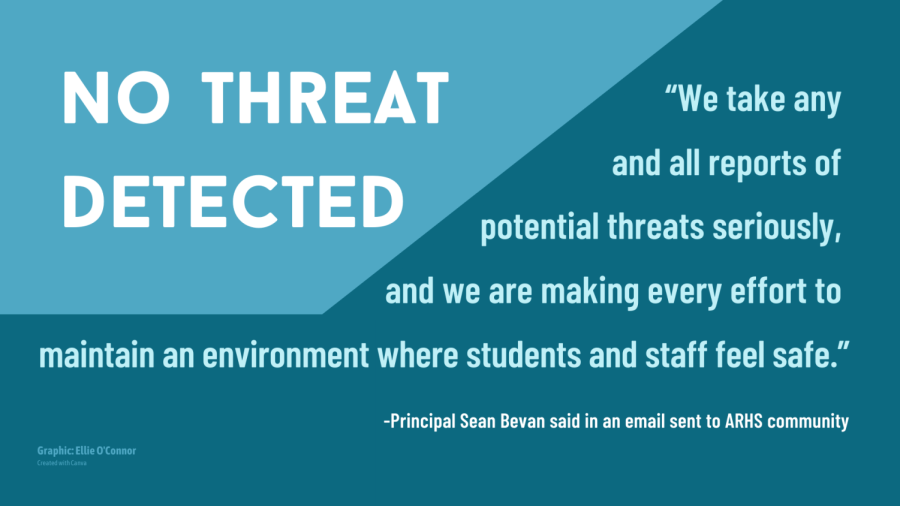Police dispatched to Algonquin in response to hoax call
Alarm raised as string of false active shooter threats makes its way through MA schools
The Northborough Police Department (NPD) determined that a phone call made on Tuesday, March 28 about a potential school shooter at Algonquin was a hoax. Police immediately responded with a sweep of the building and no threat was detected.
March 31, 2023
The Northborough Police Department (NPD) determined that a phone call made on Tuesday, March 28 about a potential school shooter at Algonquin was a hoax. Police immediately responded with a sweep of the building and no threat was detected.
According to an email sent by Principal Sean Bevan to the Algonquin community at 11:57 a.m. on the day of the incident, several adjacent communities received a similar warning within the same window of time. Additionally, Bevan reported that various Internet-based swatting calls have been made to Massachusetts schools over the past several weeks, each containing unsupported notices of violence.
“It wasn’t an isolated incident,” Bevan said. “Before we received the call…[principals of surrounding schools] were talking via email that this had already started happening in the morning, so we had begun preparations in the morning in case it happened [at Algonquin].”
According to Bevan, several Northborough police officers were immediately dispatched to Algonquin once the call was received, including Northborough Chief of Police William Lyver. They continued patrolling the halls for the remainder of the day and were assisted by Southborough, Westborough and Marlborough police officers, according to a Facebook post made by the NPD at 2:03 p.m. the same day.
The call was confirmed to be a hoax after what Bevan described as immediate communication between the NPD and Algonquin administration, who detected no initial sign of a threat inside the building.
“The details, or lack of details, in the phone call allowed us to conclude with great confidence that [the claims were] not accurate,” Bevan said. “We were able to eliminate the possibility of a real threat very quickly by [comparing] what the claims were on the call to the reality of what was in the building.”
According to NBC Boston, 28 communities across Massachusetts were confirmed to receive swatting calls on March 28. Local police departments across the state are collaborating as a part of the ongoing investigation, Bevan stated.
“At the state level, they have a coordination of agencies that trade information,” Bevan said. “[This way] you don’t simply have local towns trying to respond to what amounts to a state level–or maybe even nationwide–hoax effort.”
Thirteen minutes passed between the time police received the call and the time Bevan sent the all-clear email, during which a full physical search of the building was conducted.
“There’s always kind of a lag period between processing what’s going on and communicating about what’s going on, and that took about 13 minutes, which included all the time for examining the building,” Bevan said.
The email to students and staff, in addition to providing a summary of the incident, emphasized the effort made by administration to address concerns in a timely manner and be considerate of the feelings of staff and students when dealing with crises such as these.
“Please know that our top priority is the safety and well-being of our students and staff,” the email reads. “We take any and all reports of potential threats seriously, and we are making every effort to maintain an environment where students and staff feel safe.”
The false alarm comes in the wake of a March 27 school shooting in Nashville, TN that took the lives of three elementary school students and three adults. This incident marked the 19th school shooting that has occurred so far in 2023. Bevan speculates that the perpetrator of the swatting calls intentionally chose to strike soon after the Nashville tragedy, as part of a scare tactic during a period when tensions are high.
“My own personal opinion is that anytime we have a national, newsworthy school shooting, which of course we just had happen in Nashville, people’s emotions run a little bit higher and the hoax happened the day after that; I wonder if that contributed to the hoax callers’ planning,” Bevan said.
Bevan acknowledges the level of stress and worry that American students face as the frequency of school shootings increases and emphasizes the importance of communication and response systems when dealing with a possible threat.
“I think [Tuesday’s incident] is a reminder about how anxious American school children and adults are about school shootings, and it’s a reminder of how important our systems are to keep ourselves safe,” Bevan said.









